Interview by Jeff Melton
Photos by Jon Davis
I had the privilege of seeing the Pennsylvania based quartet, The Red Masque open the show for Present a day prior to NEARfest 2005. I was impressed by how well the quartet handled performing material from the newest CD, Feathers for Flesh on the small stage while their drummer also played keyboard at the same time. Exposť wishes to thank the group for meeting at NEARfest and to drummer and keyboardist Vonorn (aka Brian Van Korn) for submitting additional follow-up answers on-line and prefacing the entire band history.
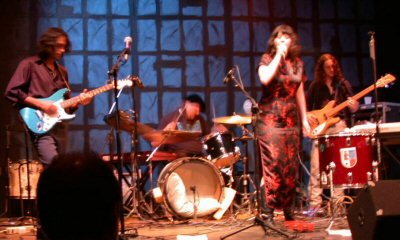
Exposť: Please tell me about your early influences and family upbringing.
Vonorn: I remember hearing muffled jazz and classical music in the womb. My mother and father were both music lovers. There would not be a day that a strange mixture of Benny Goodman and Stravinsky was not seeping into my head. Their ears were attuned to the avant garde as well as the popular. I was blessed with this world of blending musical styles. I remember one Saturday morning I woke up to the thunderous sound of flamenco guitars flailing and the stomping of leather boots. Soon after that, Rites of Spring vibrated me out of my room and downstairs to behold a monster stereo. My dad had purchased an Altec Lansing sound system. All the power of a live concert was right there in that living room. The monster was powerful enough so that I could haul my drum kit into the living room and jam with the records at full volume.
What were your first bands like?
Vonorn: When I was in an experimental three-piece in Virginia (kind of like Henry Cow meets Gentle Giant meets Zappa), my fellow band mate Jeff Bragg was holding notes on his synth while he hammered on his guitar. I thought, Hey, how can I apply this to drums and keys?
I taught myself to play drums and keys at the same time using a Korg string ensemble going through an Echoplex and MXR phaser. I started playing woodwind type instruments because I found some old organ pipes at an abandoned church. We rigged three of the flute pipes up over my kit at head level so I could blow into them as I played the drums and keys. This was nuts, but a blast. Sadly, our rag-tag experiment that also had lasers and Edmond Scientific projectors self-destructed. The house we were renting was haunted with a nasty entity and it did not like our music at all. Some of us were nearly killed and some of us nearly killed each other.
You mentioned that you had actually seen the original Happy the Man live?
Vonorn: We were preparing to do a show at U of VAís Cabel Hall. Happy the Man had done shows there a few years earlier. This is where I met Happy the Man. They were doing parts of Deathís Crown. To this day, it was one of the most remarkable shows I have ever seen. The show had two twisting and writhing Karate dancers converging into center stage while an actor behind them was rigged up to look as if he hanged himself. This visual treat was going on during The New York Dream Suite
. They also were using five to six slide projectors and they had a great team with the Blacksburg, VA Theatre Group helping to produce the show.
At the end of the concert I offered to help load out, and as we were finishing up, I sheepishly told them I composed in a similar style to theirs. Kit (Watkins) asked me to play something. I sat at the piano, swallowing hard, and nervously played a Bartok-like ostinato I had composed that week. They loved it, and then Kit and I jammed for about 10 minutes or so on two Steinway pianos in the orchestra rehearsal room. After we stopped, they applauded and asked me if I get over to Blacksburg often. I thought, Man, is this cool or what?
I went to see them a few more times until they got signed. I never did see them as a signed act. It was like watching one person with many limbs. Those were magical shows, and anyone who was lucky enough to have been there witnessed progressive music history in the making.
Tell me a bit about your early bands and work before you joined the Red Masque.
Vonorn: I had no real formal training. As a wee lad, I had one summer of guitar lessons on a moldy old acoustic in a sweltering back room music studio. The teacher hated being there as much as I, and would smash the music stand if I made a mistake. Many moons later, I hung around U of VAís 20th century music department and snuck in on many classes. My first real band was a three piece named Juice; it was kind of a combination of Cream meets Yes with a smattering of Captain Beefheart. I played drums and keys on our studio recordings. When we were about to get signed with RCA, they dropped their rock division and sent our producer off to produce country bands. In the 80ís I worked in New York at the Power Station, and I co-wrote and produced songs with Oscar winner Frank Previte of Dirty Dancing fame. I wrote songs with my partner, and style-wise, we wrote like Tears for Fears meets Peter Gabriel. I also worked with Jon Bon Joviís producer in Philly doing the usual commercial gambit.
Who actually started the Red Masque band?
Lynnette Shelley: Brandon and I both did.
Brandon Ross: It was horrible. We were both still back in Delaware and I was playing with a band that was semi-progressive and I decided that I would split from those guys. I was looking for another project that was a lot more Ďout there.í
What were you doing before starting the band?
Ross: Lynnette and I had an ad out in the paper and I had actually seen her play live before in another band. I kind of knew who she was, but I didnít know her. I auditioned for a band that she was forming which was sort of crazy. We ended up playing with that group and she will tell you about the Scrapple fest. Our first show was about 800 in attendance.
Shelley: We had only been together about a few weeks and the violin player said, Hey, we can get a gig at the TLA!
which has an 800 capacity club in Philadelphia. All this weird information started coming in about the show; first we were going to open up for Kevin Bacon.
Do you mean the Bacon Brothers?
Ross: Yeah, we said, No we are not playing for Kevin Bacon.
They had canceled the gig. Do you know what Scrapple is? Yeah itís disgusting.
Shelley: And then we found out the day before everybody would be doing a Scrapple song. We were playing our own songs but weíd do a Scrapple song. So we got there and it was complete madness. Itís like 800 people were all around the block and some radio station was putting it on. There were pigs walking all around the place. The Mayor and Miss Philadelphia were there along with the Scrapple queen. And so were all the other people singing songs about Scrapple. Then we got up there and did our regular set. Our MC was Mr. Sparkle who wore a miniskirt and combat boots. This was pretty funny; we ended up doing a couple songs and the crowd really got into it, surprisingly. It was like a first gig—pretty bizarre.
Ross: So after that the group disbanded and I decided to work with Lynnette and play with the improv group at the same time with our drummer Vonorn. Lynette and I were wondering who would be a good vocalist. She is really driven to go out and play and do something with music. We decided to audition other people and thought Delaware wasnít the place to do it. So she moved to Philadelphia and then I followed. We found a drummer and tried out the band with him before we auditioned other people. We kind of got together the proto Red Masque. When that guy left we got Steve Blumberg and Nathan Andrew-Dewin.
Shelley: After the original drummer left we practiced at the guitar playerís house. We auditioned some new drummers and finally decided on Brian. Once we did that, which was February 2001, we officially changed the name to Red Masque. We started playing out and we did the Death of the Red Mask album. Then we started shifting the line up. Next we had Victoria Harris as Kia wasnít in yet. We had another keyboardist and then decided to go to a four piece and then did the album.
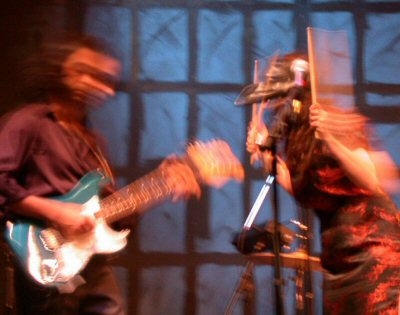
Vonorn: I was playing on the same bill with the old version of the band at the Philcon sci-fi convention. My band played in the morning and I stayed on to see the last band. I was quite impressed with this menagerie of dancers in costume, and a full concert harp, There was a medieval bird head mask on the guitarist who also used a speed drill against the guitar body for effects, and a tall ghostly female siren pounding on a large floor tom. The bass player was in full 70s regalia barking out twisted bass tones, and there was a drum set that went from here to next Tuesday, and the drummer knew how to use those drums quite well. In a word, it was both insane and impressive. The material had twists and turns that I thought were very 70s progressive. I talked at length with Brandon and found we were kindred spirits in political and musical thinking. I helped them load out. We exchanged contact info and a few weeks later I got a call from Lynette asking me if I would be interested in trying out on drums and I said, Okay, it sounds cool.
I came out with my friendís ancient drum kit. I could see there was some heavy disdain in their faces. My kit was a third the size of their last playerís. I believed I impressed them because I ended up leaving the kit there and I believe I joined that day or the next weekend.
Kiarash Emami: One of the tracks on that was recorded by a short time guitarist for one month and then he decided to become a used car salesman.
Ross: He decided that was more important.
Well it takes some perseverance to get here, there is no doubt about that.
Ross: I think that I respect bands that have a vision. We were talking about Magma the other day. They are just above so many other things itís because of the vision there.
Shelley: Itís not like playing isnít fun. Itís like Iím in Magma.
Iíd like to ask you about the Edgar Allen Poe reference. Are you an extension of Goth—in a classical gothic concept? Or the Goth we have come to know as a generic alternative rock and roll term? How would you say you locked into that mode that personifies what the band is about?
Shelley: Well I think it is important to say that itís classical gothic. I think a lot of people have a misconception that we are like this. You know with the face painted white.
Ross: No one is wearing vinyl though. There is no vinyl in the band.
Emami: I think it is different; we are not singing about vampires or anything; I think it is more expanding and bringing in more elements. It was a more dominant concept even before I joined two or three years ago. Now the sound and color of the elements of the music are expanding into other themes.
I wanted to talk to you about your influences too. Youíve evolved in a short period of time due in part to ReR influences and your rock in opposition associations. You guys are gradually getting into an experimental type of thing that is working well.
Shelley: Yeah we just both read a lot, mostly HP Lovecraft a lot of those types of things. We only have one song dedication.
Emami: There is always a distinction of subject and elements in art. You always have elements to the media and you donít realize it. You know I guess Medieval, Renaissance, or Goth elements are just cool elements to play with. It doesnít mean you are going to live that though.
Ross: You are just a writer and exploring different themes.
Shelley: I was just downstairs and some guy asks me, Are you Goth or Wiccan?
Neither actually. You wear black, and so you are this or that, so itís kind of silly.
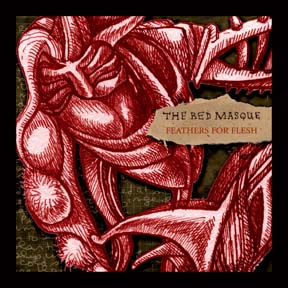
I was at the Present show on Thursday night (before NEARfest) and I think we had a little bit of concern that your drummer was a little overtaxed. Was that because you lost your drummer?
Shelley: Originally it was because we lost our keyboard player, as there was a death in the family. It was difficult after that year and he decided to leave too and then we decided to try another keyboardist.
Emami: She was a professional pianist, but in terms of taste and style we were not quite compatible for the sounds we were trying to create. It was a real conflict and she was the only real musician. Then what happened was that the four piece band just came together because some us have minimal knowledge of keyboards and wanted a professional keyboardist. Vonorn appreciated both keyboards and drums.
Tell me the circumstances under which you play keyboards and drums together live on stage. How did you decide this was a viable alternative? Also what challenges does it present for you?
Vonorn: In my drum and keys setup I replace my floor tom with a keyboard. I use a microphone bookstand for my Theremin and put that behind and over the keyboard. I also play chords and solo lines on my Korg Karma. I use my left hand on the kit and my right for keys, didgeridoo, prayer flute or Theremin. At cues in the material I turn on my drum throne and play the keys, but I still keep my feet on the kick pedal and hi hat. In playing the Out Scream
live I play the chords with my right hand and keep the groove going with my left hand and feet. At times I will also strike my keys as if they are a percussion instrument as well. How this insanity came about was that we were practicing and were down one keyboardist, so I just dug into my old bag of tricks and started to play both instruments in unison.
It has worked well enough as people have come up and commented how the keys and drums blended so well with each other. It can really do a job on your arm and knuckles, as you have to turn very fast some times. To me the challenge is like chewing gum backwards and walking upside down, you really have to concentrate and let go at the same time. I really have a lot of fun performing this way; itís the ultimate right brain left brain adventure. I am working on playing the bass, keys and drums also.
Emami: So what it came down to was the four piece was very stable in terms of balance and composition. In the studio we didnít have a problem doing multiple things at the same time but itís very dynamic when it comes to presentation. We are bound to shrink it down, condensing even this in a way as itís his way of handling the essential keyboards and drums. We are toying with the idea of adding a fifth member. Maybe we will just add an auxiliary member to fill in on some percussion and keyboard to make it sound bigger and easier to handle. But it still hasnít been realized, yet; we have to digest this over time.
Shelley: Itís a lot easier with four people.
Ross: Yeah, five people sometimes.
It seems you just havenít found the right person yet. On a live stage you are more confined and have to be able to focus on stuff at hand and delivering that, correct?
Ross: It depends on time because we have had shows where we have done a lot more. At the New Jersey prog house weíve done a lot of improvs.
Shelley: Look how many shows we have been doing for 45 minutes.
Ross: We have to plan out sets.
Shelley: We could just keep on going.
Emami, tell me how you joined the band.
Emami: In the summer of 2002, I had this ad in the musician.com so I was ready to join a project. I tried other people and it didnít work out. Eventually, these guys were looking around and Lynnette emailed me. I was not quite serious at the time as I thought I was locked in with another guy, but that fell apart. So I emailed her because I listened to their music and liked it. They were promoting themselves in Philadelphia at a Jethro Tull concert. I asked them if they needed somebody, and they asked me to jump in.
Shelley: We had two guys but they turned out to be heroin addicts.
Emami: I auditioned at Nathanís place. It was just Lynnette and Brandon; the drummer wasnít there. We jammed for 10 or 15 minutes and then they said, Youíre in.
I think without even knowing it, no transcript or anything we just sat there and jammed and everything was natural with no complaints.
Shelley: Yeah, we liked him because we found a guitarist with taste and no big ego. Plus heís cute and he is our age and is like everybody in the same place in our life.
Please tell me about the recording of the latest record. Plus you have some new songs in the beginning stages. Tell me about your songwriting approach.
Emami: On the latest project I was involved in just two songs.
Ross: With general structures.
Shelley: He definitely came in and he helped us work it out.
Ross: You all did 'cause people kept coming and going, so it was hard to piece them together the way we wanted them.
Emami: These guys had experience with previous recordings. They would just go three days and play at any level and just record and release. Here we didnít have the capability but we had the luxury of an in-house studio. We basically could have a multiple step recording, which was an experiment. Itís something we hadnít tried beforeóto see if this approach is better or not.
Ross: It was a huge, huge learning experience; we tried so many different things.
Shelley: Recording, engineering, and mixing. You put yourself in any of those roles, as the person making the racket. You would look at it from many different angles. If you ask somebody else, they could record you outside of the band.
Tell me about the arrangements you worked on for the last studio recording.
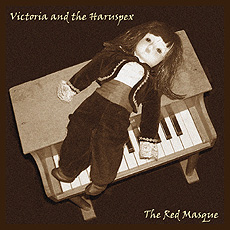
Vonorn: I played drums on Victoria; on Feathers for Flesh I played drums, keys, bass, guitar, and Theremin. Since I produced and mixed the CD, I was for the most part given free reign on the arrangements. We had a lot of ideas but not quite flowing so to speak before we hit the studio. I did a lot of late night experimenting with building vocal choirs and ghostly flute sections. At one time in House of Ash
I envisioned three vocal choirs center, left and right stage. The choirs are doing rounds against each other; itís in the pipe organ section of House of Ash
. In Protools I was experimenting with different placements of sections so they would flow as a cohesive sound blanket. In the studio entire sound collages were created to start out House of Ash
.
Did it change your original idea into something you may not have intended? On the other hand you may be looking for somebody who wants to enhance something that you donít quite have a handle on.
Emami: You just get a better understanding of our weaknesses and strengths; the way we are and things. We can do some good playing and explore. We have learned a lot and I think we are going to have a more efficient recording for the next record.
Which track do you think works best from Feathers for Flesh?
Emami: I think it is House of Ash
; I think Beggars and Thieves
is an exception and I canít compare it to any other songs.
I believe the reason that is a good track is that it is a contrasting piece. Those types of songs draw attention to themselves because they are a relief after something dark and heavy.
Emami: I was proud of Passage
. It was my favorite song on the album and I really enjoy playing it and listening to it.
Ross: It is hard to decide about all of this. The House of Ash
we wrote while we were in the midst of recording and I like the track a lot. I also like the last song that Lynette did. That is the creepy one.
Ross: Yeah I could just sit back and listen to what was going on and how they were experimenting and there wasnít much pressure on me.
Shelley: The last track was the most fun just because we could do a scream on it.
Which have been the most memorable gigs for the band so far?
Vonorn: I found the NJ Prog House to be one of the most memorable gigs because the place was supposed to be haunted. During our first intermission I walked around the floors a bit and discovered myself upstairs. The odd thing was downstairs was quite loud but upstairs only 30 feet away was muffled in some way. In my explorations I found a mannequin in a very dark bathroom closet. I felt this would be a great prop for our second half and I moved the mannequin out of the closet. Just when I closed the closet door, the bathroom window shutter came crashing down. I tore out of the room and fell onto an old bed as the room was getting darker and colder. I felt like I was moving in slow motion. One of the doors in the room was slowly opening as I was attempting to vacate this fearful perch. Something was trying to be seen or at least felt, it felt confused and angry. The door was opening wider as the room became darker. I looked at my watch and saw only a few minutes had passed since coming upstairs. I was thinking, Man, oh man. Do I want out of here?
Just when I said that the spell was broken. A friendly face peered in and said, Yeah these weird ghosts can really fuck with your head but donít worry they want you downstairs.
I said thank you to my savior and went down to finish our concert. After our concert I related my tale of terror and the really odd thing was nobody remembered seeing anyone who fit the description of the friendly-faced fellow.
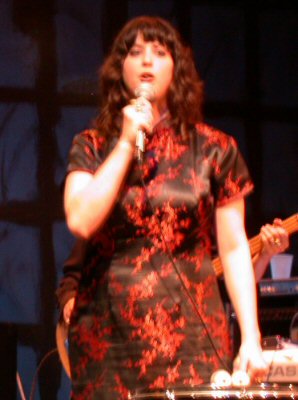
How would you say the new material is shaping up compared to the last CD?
Shelley: Itís different, with the exception of The House of Ash
. It is basically a band effort, as opposed to everyone having an idea and then manipulating it.
Emami: We decided to change from a single person having an idea and then trying to keep it and add onto it; let it compose itself as it goes along. We decided to work with the songs and then play them live. And let it evolve and see what happens. When you recorded in the past, after four or five shows, the songs are hardly distinguishable. So we decided to let things happen and we would capture it.
Ross: By the time we get to recording they will be in a more evolved state.
Vonorn: We have worked out a fairly fast template system. Brandon and I will work the grooves out in real-time in my studio on Protools. In real time Iím using my two index fingers as drum sticks. I play my drum parts, on my Yamaha Motif. Brandon plays bass through my Pod and we lay down the arrangement in separate sections A, B, C, D, etc. Lynnette will sing in the room or go through the mixer for rough vocal placement tracks. I then place the various tracks into a song form for our later keeper tracks. Our creative system is moving along faster than our previous writing sessions.
In the 70s King Crimson was notorious for playing a lot of new material live and then they would take it into the studio.
Emami: The ultimate thing is really how itís going to sound on stage. If the recording is as close to that feel then you are at a good level of success. Otherwise you do it on a deadline and have to get something recorded and shipped. That was pretty much the previous album. This one will come when we have adopted that approach and let things move on.
Shelley: I would like to think this year it may come out.
Are you looking for a new label?
Shelley: There is a label interested and they want to hear the album first to see if they like it or not. Itís not that we wouldnít like some other labels fighting over it. We really want to have some people hear this. I feel like sometimes we get lost and get ignored. One thing different about this recording is that we have a theme in mind. I wrote it out and certain imagery was going on. I wouldnít say it wasnít a concept album or a romantic album.